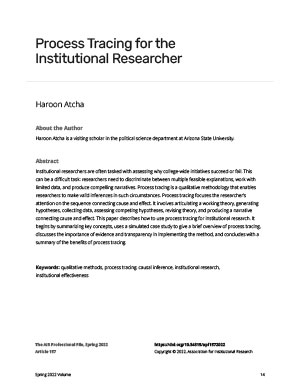The AIR Professional File
Spring 2022, Article 157
Process Tracing for the Institutional Researcher
https://doi.org/10.34315/apf1572022Abstract
Institutional researchers are often tasked with assessing why college-wide initiatives succeed or fail. This can be a difficult task: researchers need to discriminate between multiple feasible explanations, work with limited data, and produce compelling narratives. Process tracing is a qualitative methodology that enables researchers to make valid inferences in such circumstances. Process tracing focuses the researcher’s attention on the sequence connecting cause and effect. It involves articulating a working theory, generating hypotheses, collecting data, assessing competing hypotheses, revising theory, and producing a narrative connecting cause and effect. This paper describes how to use process tracing for institutional research. It begins by summarizing key concepts, uses a simulated case study to give a brief overview of process tracing, discusses the importance of evidence and transparency in implementing the method, and concludes with a summary of the benefits of process tracing.
Keywords: qualitative methods, process tracing, causal inference, institutional research, institutional effectiveness
Additional Information
Author
Haroon Atcha, Arizona State University
Copyright © Association for Institutional Research 2022

